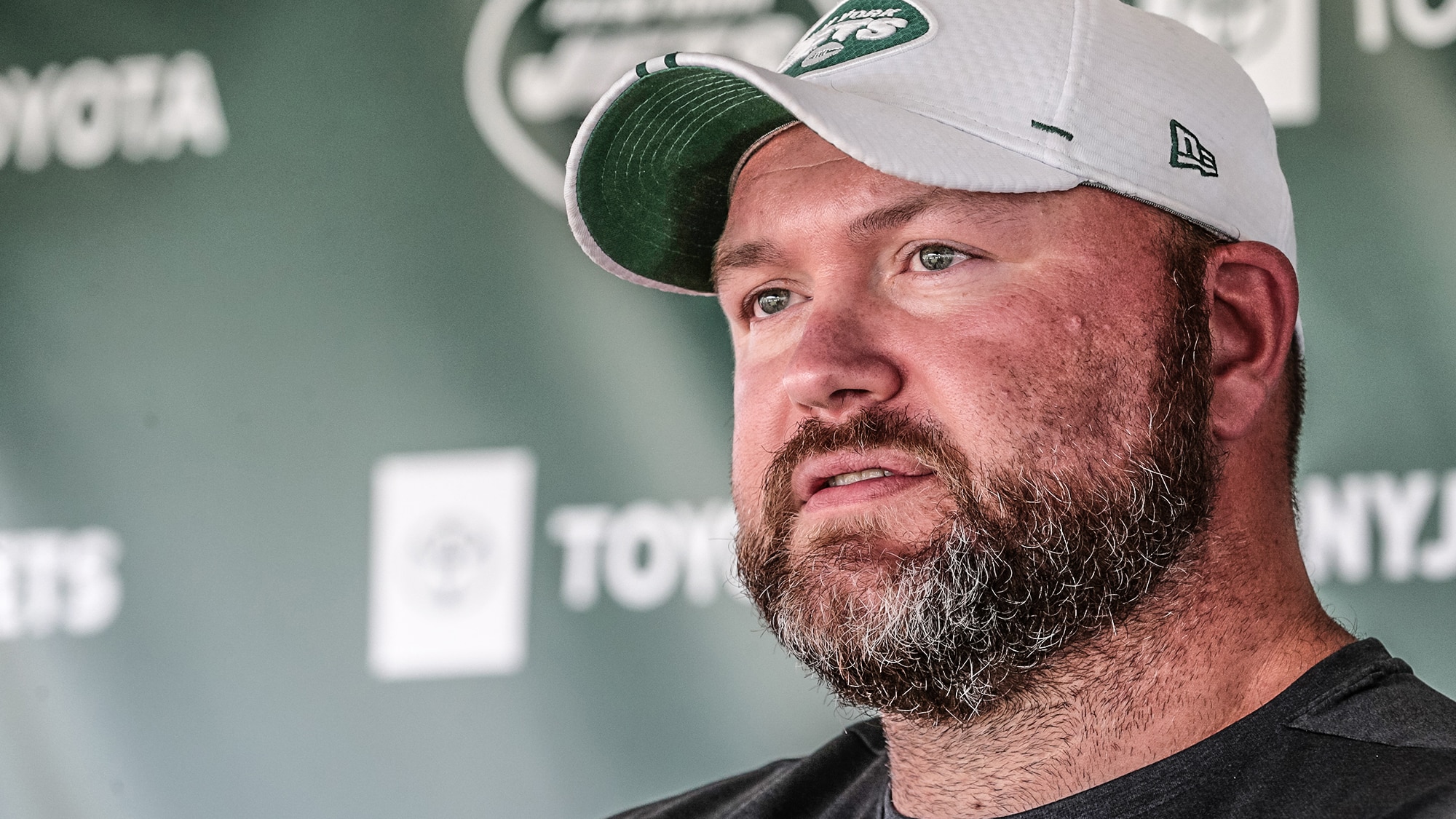These four traits shown by Joe Douglas are signs that he very well may be the leader that the New York Jets have been yearning for.
Proper understanding of positional valuation
For far too long, the Jets sat back and watched their offensive line disintegrate into dust while doing nothing to stop it.
From 2007-19 (following the selections of Nick Mangold and D’Brickashaw Ferguson in 2006’s first round), the Jets did not draft a single offensive lineman in the first round. The only one that they picked in the top-70 was Vladimir Ducasse, who was taken 61st overall in 2010’s second round. He, of course, turned out to be a major whiff.
That was reasonable for the first few years of that stretch. Mangold and Ferguson anchored some consistently good units alongside veterans like Brandon Moore, Damien Woody, and Alan Faneca. However, as the early-to-mid-2010s approached and those players moved on, it gradually became more clear that the offensive line needed some new juice.
Yet, the big moves never came.
Years of neglect came to a head in 2019. A season that was supposed to be a stepping stone turned out to be a disappointment – primarily due to the severe lack of talent in the trenches. The league’s 31st-ranked offensive line stunted the growth of the entire franchise, preventing Sam Darnold from enjoying a breakout season and giving Le’Veon Bell no chance to prove himself worthy of his $52.5 million contract.
The construction of any high-quality offense starts with a sturdy offensive line. No skill position player can find consistent success without a consistent group up front.
At least based on their bodies of work, neither Mike Maccagnan nor John Idzik understood that concept at all.
Enter Joe Douglas.
Finally, the Jets seem to have a decision-maker who understands how championship-caliber teams are built. Douglas has aggressively attacked the team’s primary handicap from day one.
Joe Douglas has signed or traded for SIX OL in his short time as Jets GM.
Mike Maccagnan signed or traded for SEVEN OL who made it to Week 1 over five offseasons (NINE total).
***Offseason numbers, re-signings not included.
An incredible and telling comparison. #TakeFlight
— Robby Sabo (@RobbySabo) March 30, 2020
Joe Douglas draft picks: 1
Joe Douglas trade value chart points invested into OL: 1,250Mike Maccagnan draft picks: 34
Mike Maccagnan trade value chart points invested into OL: 188— Michael Nania (@Michael_Nania) April 24, 2020
Seeing Douglas emphasize the offensive line has been extremely promising. It shows us two things – not only does he have a clear understanding of the position’s premier importance, but he also has a strong grasp of his own roster’s strengths and weaknesses.
Knowledge of the free agent market and draft board
Douglas has shown a great feel for the rest of the league. Nothing has seemed to catch him by surprise.
In free agency, Douglas was largely frugal. He elected not to get in bidding wars for players at positions of need such as Jack Conklin, Graham Glasgow, Byron Jones, James Bradberry, Dante Fowler, Kyle Van Noy, and Robert Quinn among others. The Jets also passed on re-signing Robby Anderson.
For Douglas to pass up on solid-to-great players like those, he and his staff must have had a strong conviction in their own evaluations. They certainly felt that those players either would not fit in the Jets’ offensive/defensive scheme or that they are not actually as good as the league or the public perceives them.
It is comforting to see the front office hold firm and trust its own findings rather than give in to the compulsion of a quick fix. Just because a seemingly good starter is out there and you have the money to pay him, it does not mean that signing him will move your organization closer to winning a championship.
There are countless details beneath the surface that dictate a free agent’s likelihood of succeeding with a new team – those of which cannot be discovered without endless film study (is he overrated by stats, is he a scheme fit, does he take plays off, etc.) and exclusive intel (attitude/off-field, potentially undisclosed injury issues, willingness to play for a team, etc.). The average outside onlooker has neither of those things.
While it is not good to be too cheap (which Douglas was not, as we will get into more later), it was a refreshing change of pace to see Douglas sticking to his guns. He established that he won’t be taken for a ride in negotiations, which is an extremely key trait for any successful general manager (that Maccagnan certainly did not have).
Douglas’ lack of upper-tier additions may hurt the team’s talent a tad in the short-term – they may regret not having Conklin or Glasgow in 2020 – but it will have positive long-term effects as the Jets maintain the potential to use their cap space in more efficient ways.
Douglas allowed the market to play out and let the value come to him. Brian Poole was arguably the league’s best slot corner from a production standpoint, and Douglas got him back on a one-year, $5 million deal. Connor McGovern is in his prime at 27 years old, has missed one game in three seasons, and just played like a top-10 center in his first season as a full-time starter at the position. Douglas inked him to a deal with just $18 million in guarantees, 11th-most among centers.
Additionally, Douglas maintained future cap flexibility with one-year or front-loaded deals to players like Alex Lewis, George Fant, Jordan Jenkins, Breshad Perriman, Pierre Desir, and Greg Van Roten.
Douglas also showed a great feel for the league in the draft.
Rumors circulated in the days leading up to the first round that Douglas was exploring a trade-up to ensure his team could grab one of the top-four offensive tackles.
Whether or not those rumors were true, Douglas was wise to hang tight. As it turned out, not only was Douglas able to stay put at No. 11 and get a top-four tackle, but he had his choice of two (Becton or Tristan Wirfs).
Douglas then displayed some wizardry in the second round.
Fans rooted feverishly for Baylor wide receiver Denzel Mims to fall to the Jets’ initial second-round slot at No. 48 – and he did. Shockingly, Douglas traded the pick to Seattle and moved down to No. 59 (netting a third-round pick).
Lo and behold, Mims made it through the next 11 picks and was still there for the Jets at No. 59, where Douglas grabbed him. It was. . . beautiful.
Douglas then flipped the 101st overall pick that he received from Seattle to New England for two high fourth-round picks (No. 125 and 129), using those on La’Mical Perine and James Morgan.
Jets fans were clamoring for the team to take Virginia cornerback Bryce Hall with one of those fourth-round picks. Douglas didn’t oblige. . . but he did one round later, snagging Hall with the 158th overall pick in the fifth round.
Douglas displayed a great understanding of the board throughout his first draft, checking off need after need in a shrewd fashion.
Clear vision
Douglas has consistently insisted that a big part of his team-building approach will be establishing a culture that is conducive to winning.
Most teams make the same exact claim, but few actually live up to it.
Douglas has walked his talk.





